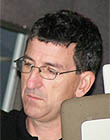|
|
This topic comprises 2 pages: 1 2
|
|
Author
|
Topic: Proposed New Audio Watermarking System
|
Mark Lensenmayer
Phenomenal Film Handler

Posts: 1605
From: Upper Arlington, OH
Registered: Sep 1999
|
 posted 03-03-2009 02:58 PM
posted 03-03-2009 02:58 PM




From Physorg.com:
Audio Watermarking Technique Could Locate Movie Pirates
by Lisa Zyga
quote:
Camcorder piracy - which occurs when moviegoers bring a camcorder into a theater to record a movie from the screen - is a rapidly growing illegal activity. In the US, camcorder piracy has been illegal since 2005, when the Family Entertainment and Copyright Act banned the use of recording devices in theaters. Nevertheless, according to the Motion Picture Association, camcorder piracy causes an annual loss of $6.1 billion to the movie industry.
In an attempt to deter camcorder piracy, researchers have been developing watermarking techniques that embed a secret message into a movie indicating when and where the movie was shown. Once the movie is posted on the Internet, this secret message can be extracted to reveal the movie theater and showtime, and the theater can implement additional surveillance to deter piracy. However, these watermarking techniques cannot identify the recording location in the theater.
Now, a newly proposed position estimation system can use an audio watermarked signal embedded into a movie soundtrack to estimate the camcorder's location in a theater to within half a meter - basically down to a specific seat. Yuta Nakashima, Ryuki Tachibana, and Noboru Babaguchi of Osaka University have developed the new technique, and their results will be published in an upcoming issue of IEEE Transactions on Multimedia.
As the researchers explain in their study, the position estimation system works by taking advantage of the different channels of the soundtrack, called "host signals." A watermark embedder generates a watermark signal for each host signal, generating a "watermarked host signal" (WHS). Separate loudspeakers emit each WHS, and a camcorder will record the audio as a mixture of all the WHSs as a single recorded signal.
In this monaural recorded signal, the watermarked host signal from each loudspeaker is delayed in proportion to the distance from its loudspeaker (the source of origin) to the camcorder's microphone. The watermark detector can calculate these delays by determining the strengths of each watermarked host signal. Specifically, the detection strength of each watermarked signal will have a peak at a particular time dependent on the delay times.
As the researchers explain, this audio watermarking method could be combined with a conventional watermarking method, which together could determine the move theater, showtime, and the seat in the theater. Then, a person identification system - such as a ticketing system or video surveillance - could identify the pirate.
Although the researchers performed experiments with the system, they plan to investigate the technique further. One challenge they face is ensuring that the acoustic quality remains high in the midst of various environmental factors and background noise. The researchers also plan to investigate the robustness of the system against attacks that may cause the system to estimate an irrelevant position, and to detect these attacks and account for them, if necessary.
| IP: Logged
|
|
|
|
|
|
|
|
|
|
|
|
|
|
|
|
|
|
|
|
|
|
|
|
|
|
|
|
|
|
|
|
All times are Central (GMT -6:00)
|
This topic comprises 2 pages: 1 2
|
Powered by Infopop Corporation
UBB.classicTM
6.3.1.2
The Film-Tech Forums are designed for various members related to the cinema industry to express their opinions, viewpoints and testimonials on various products, services and events based upon speculation, personal knowledge and factual information through use, therefore all views represented here allow no liability upon the publishers of this web site and the owners of said views assume no liability for any ill will resulting from these postings. The posts made here are for educational as well as entertainment purposes and as such anyone viewing this portion of the website must accept these views as statements of the author of that opinion
and agrees to release the authors from any and all liability.
|

 Home
Home
 Products
Products
 Store
Store
 Forum
Forum
 Warehouse
Warehouse
 Contact Us
Contact Us




 Printer-friendly view of this topic
Printer-friendly view of this topic






![[Smile]](smile.gif)


![[Roll Eyes]](rolleyes.gif)


![[Big Grin]](biggrin.gif)



![[Razz]](tongue.gif) : once I downloaded cam copy (how sinful
: once I downloaded cam copy (how sinful 


